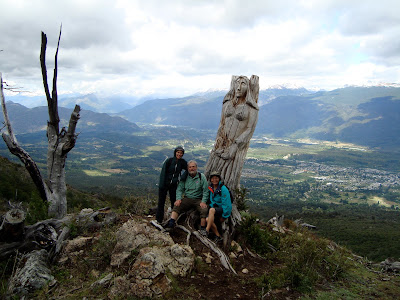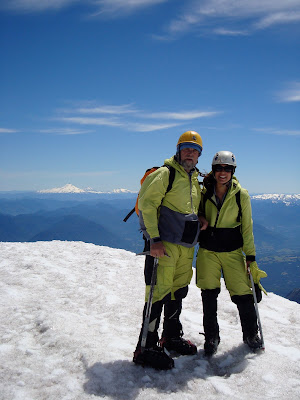Linares, Chile 2/27/2010
The moon and mosquitoes were out in full force the night of the earthquake. Huddling together in small groups of families my neighborhood migrated to safer ground, where we stood in a large open field waiting with sleepy eyes for our nerves to calm down and for the sun to come up. It was 3:30AM when the earthquake hit Linares, and I was amidst a deep sleep, like most nights. Although I was woken to my bed shaking, as if I was on a turbulent plane or driving over a washboard road, I was determined to keep sleeping, unaware of the earthquake enormity. Two frantic family members, my host-sister and host-mom barged into my room yelling in Spanish, “Come Elena! Get out of the house!” I grabbed my jacket and stumbled into the moonlight, where Spanish words were flying like lightening in the air around me. As the sun began to rise, my host-dad collected blankets from inside, and we curled up on the front porch to rest our eyes. Yunuen, the other IDIP student here in Linares, walked to my house with her family, bringing information that our weekend trip to Santiago was officially canceled; the Pan-American Highway had suffered several bridge collapses.
The following day was a mixture of shock and calm vacancy in downtown Linares; nothing was open, electricity and water were cut off, and few cars drove on the streets. People walked everywhere, taking pictures, observing the damage, and sharing stories about their night. In my neighborhood the houses are fairly new and made of cement with metal roofs and so there was no damage, however it was a different scene in the town center where most businesses are old structures made from adobe and clay shingles.
Many roofs were fractured and glass from shattered windows was everywhere, however the majority of buildings in Linares withstood the quake. While Intermittent structures sat destroyed, as if a bomb had been dropped right on top of them, Linares experienced minor damage and few deaths compared to many other places in Chile.
I stood in a line waiting for bread (a staple part of every Chilean’s diet) with my host-sister. We could only find one store that was open and they were allotting one bag of freshly made bread per person at double the normal price, 1,000 pesos ($2). Most people in Chile eat fresh and seasonal produce and cupboards are not stacked with preserved foods like they are back in the U.S. Additionally, many Chileans are paid a daily wage for work instead of bi-weekly like in the States. Because of this, grocery shopping in Linares is a daily chore and a single day without open stores can cause major alarm for families whose survival mode gets kicked into high gear.
In the days that followed the quake, everyone in Linares seemed to be waiting; routines were put on hold, nerves were high, families stayed close together, people were overly alert to every tremor and aftershock, and the uncertainty of when the water and electricity would come back on began to cause chaos. Essentials like candles, water, and bread were sold at triple the value, and everyone was frantic to get in contact with their loved ones. Without electricity we had no contact with other parts of Chile, and we still didn’t know the extent of destruction and the strength of the earthquake.
On Sunday, the river behind my house was filled with people bathing, the church down the block was holding a baptism and a funeral at the same time, and news spread that a water truck was coming to my neighborhood, creating a frenzy of people who flocked to the streets. I stood on the outside from all this, not only as a foreigner but because my host-family was extremely prepared and in the best of conditions. The one radio in town functioning off a generator announced that the tap water, which is always potable in Chile, would come on for 15 minutes between 2-3PM. When my family, sitting around a table outside listening intently to our small portable radio, heard this news every person situated themselves at a faucet with empty bottles, ready to collect. We moved all of the mattresses into the living room, close to the door, and slept together for the first three nights. We all slept with our clothes on and our shoes at our beds, fully prepared to jump up and out of the house in case of another strong tremor.
On Sunday night, the radio station set up a TV outside powered by a generator and people crowded around to capture some information about the rest of the country. Images of entire beach towns in rubble, places I had visited just weeks before, boats and cars flipped on their sides and washed to shore, and traumatized faces began to flood in. The radio crew, San Antonio De Padua, worked ceaselessly and heroically, transmitting information, answering phone-calls, organizing the community, and sending words across the airwaves of hope, solidarity, and support. By Monday morning, power and electricity had been restored in Linares and a new phase had begun: the phase of reconstruction and emergency aid.
Although Linares was taking care of itself and starting to operate again, using police to manage the traffic, military to control the supermarkets, workers to clean up the wreckage, and busy residents to cleanout their homes, the call for help among places more affected intensified. Since our time in Chile, Yunuen and I have both been working on internships with Caritas International, a social development foundation that establishes programs to benefit low-income communities. Following the earthquake, the Caritas office in Linares became the principal organizer, sending aid relief to destroyed areas. Caritas immediately started receiving donations; bags of cloths, sacks of food, bottles of water, trucks to transport, and volunteers to give their time. Whether it was a carload full of food, or a small bag of rice, it all added up, it continues to add up, and every bit of help is vital and life giving. Yunuen and I made a trip to Cuaquenes bringing water, food, and clothes to communities still without electricity and running water, 5 days after the quake. In the plaza eager volunteers from the local church youth group greeted our team from Caritas.
The strength and determination to bring help, to rebuild their country, to support their friends and family is overwhelming among the Chilean community. After watching two days of painful news, the Chilean government started making deliveries to coastal towns and places accessible only by air. I know that the news, especially international news, often focuses on the most devastating negative situations, but I can’t emphasize enough the generosity and continual acts of kindness and compassion that are occurring right now in Chile. For every looting you see on the news, thousands of people are compiling clothes, donating money and spending devoted time in solidarity with their country.
Walking around my neighborhood today I see that everyone has brought out their flags, and they are hanging with hope and courage from every windowsill. Cars, buses, taxis all have “Fuerza Chile!” written all over them, and the plaza is filled with volunteers collecting food. Yes, it will take years to reconstruct Chile, and a lifetime to heal the devastated hearts, but right now Chile is standing on its own two feet in the most beautiful of ways, by helping itself, “Chile ayuda Chile”, and trying its hardest to respond to every voice that needs support. I have been taken care of and looked after in this community for two months, and although I am eager to get home and be with my own family, I will be sad to leave behind my host-family, the Caritas community, and a country amidst the restoration process of such a crisis.




 Gifted graffiti artists fill the streets with color.
Gifted graffiti artists fill the streets with color.
















